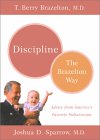 Book Reviews by Sondra Eklund
Book Reviews by Sondra Eklund  Book Reviews by Sondra Eklund
Book Reviews by Sondra Eklund |
Buy from Amazon.com
Rate this Book Sonderbooks 48 Previous Book Next Book Nonfiction Parenting Previous Book Next Book Fiction Young Adult Fiction Children's Nonfiction Children's Fiction Picture Books 2004 Stand-outs 2003 Stand-outs 2002 Stand-outs 2001 Stand-outs Five-Star Books Four-Star Books Previous Book Next Book Old Favorites Back Issues List of Reviews by Title List of Reviews by Author Why Read? Children and Books Links For Book Lovers Book Discussion Forum About Me Contact Me Subscribe Make a Donation I don't review books I don't like! *****= An all-time favorite |

****DisciplineThe Brazelton Wayby T. Berry Brazelton, M.D. and Joshua D. Sparrow, M.D. Reviewed
03/03/03.
Perseus Publishing, New York, 2003. 160 pages. Available at Sembach Library (649 BRA) Why would I check out a book for parents of babies and very young children? Well, it’s partly nostalgia. Books by T. Berry Brazelton were some of the first books on parenting I ever read, at the recommendation of my friend Doris. (Thanks, Doris!) I did not, however, check out the books on Calming Your Fussy Baby and Sleeping Through the Night. My nostalgia didn’t go that far. Of course, the other reason is that discipline is not something that your kids outgrow the need for, at least not while they’re still living at home. It is a controversial issue, and I already know that I agree with Dr. Brazelton’s moderate, rational and wise approach. The book had some good reminders. For example, I like his discussion on eating. He reminds us, “in battles over food, a child will inevitably win.” He also points out that a child should be in control of what he puts into his own body. It’s funny, but now that my teenage son has finally outgrown his incredibly picky eating habits, I’m more tempted to pressure my younger son to eat what I want him to. All along I reasoned that the only things I hate as an adult are the things I was forced to eat as a child, and tried not to pressure my kids. Now that philosophy is proving to have worked as hunger overwhelms pickiness in my teenage son. So why can’t I remember it with my younger boy? Overall, Dr. Brazelton takes an approach that we need to understand a child’s needs and motivations before we discipline. For example, a toddler is only beginning to learn to communicate. To that child, the many different inflections in his mother’s voice as she says “No” about the same thing might mean something different each time. He’s curious. Does she really mean the same thing when she frowns with the “No” as when she smiles? One of the hallmarks of Dr. Brazelton’s approach is that he believes the goal of discipline is self-discipline. One suggested statement to a child is “When you lose control, I have to do something to stop you, until you can stop yourself.” In every interaction, the emphasis is that the discipline is to help the child learn to behave well on his own, not just to force him to behave in a way that pleases his parents. I think that Dr. Brazelton’s method of parenting is a beautiful picture of what God is like. If only we believed that discipline from God was designed to help us become better people, the kind of people we ourselves would like to be. I heartily recommend this book to parents of young children, but there are also some good reminders for parents of older children. Copyright © 2005 Sondra Eklund. All
rights reserved. |